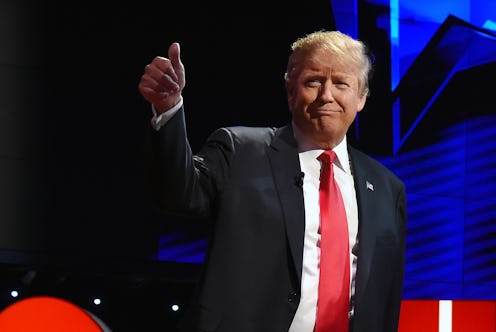News
Donald Trump Broke All The Rules In 2015
Donald Trump shocked just about everybody in 2015. First, he actually threw his hat in the ring and ran for president, as opposed to just hinting that he might run for president and then backing out at the last minute. More importantly, he trounced all of his Republican rivals in the polls after his announcement, and then continued to do so for the rest of the year. In 2015, Donald Trump broke all the rules, shattering conventional political wisdom and serving as an important reminder that politics, as immutable as they sometimes seem, are constantly subject to change.
Nowadays, Trump's dominance in the GOP primary is more or less taken as a given, but it's worth remembering that the press almost uniformly wrote him off as a gimmick earlier in the year. Back in June, FiveThirtyEight declared that Trump "isn't a real candidate." The next month, The New York Times explained why "it's highly unlikely [Trump will] avoid decline after encountering scrutiny" by the media. The Huffington Post refused to even cover Trump in its politics section (opting to put him in entertainment), explaining that his campaign is "a sideshow," while The Atlantic confidently proclaimed that "Trump is this year's Herman Cain" — Cain, famously, did not receive the Republican nomination in 2012.
Obviously, this all looks very foolish in retrospect. But while shaming the journalists who were so wrong about all of this may be fun, it's not terribly instructive or enlightening. What's much more helpful is to look at precisely why these pundits thought Trump would inevitably collapse, because the reasons they cited are the precise reasons we should be much more skeptical of in the future.
In fact, political writers cited a whole bunch of reasons in explaining why Trump didn't have a chance. One was that he had very high unfavorability ratings within the Republican Party — or, as FiveThirtyEight put it, that he's "the first candidate in modern presidential primary history to begin the campaign with a majority of his own party disliking him." Pundits also pointed to the fact that Trump hasn't held political office or served in the military, unlike every other president in history. Many suggested that Trump's rhetoric was simply too offensive for him to have a serious shot, while others claimed that his history as a liberal would doom him in a GOP primary.
It's now easy to see the flaws in these bits of reasoning. Trump uses his lack of political experience as an asset; he depicts himself not as a novice, but as an outsider who will stand up to the establishment. Sure, the majority of his party dislikes him — but enough Republicans do like him to prevent the other candidates from consolidating support and pulling into the lead. His history as a liberal clearly doesn't matter to his supporters nearly as much as his personality and rhetoric do. And as for saying flatly racist and bigoted things on the regular? Maybe that's not actually an impediment to winning a Republican primary.
Now, Trump obviously hasn't won anything yet, but the number of people insisting that he has no chance of winning the Republican primary is dwindling by the day. What we have to tentatively conclude, then, is that a presidential candidate who is hated by his own party, has never held elected office, and says grossly offensive things on a regular basis isn't necessarily a no-shot candidate. That sentiment flies directly in the face of conventional political wisdom — but as Donald Trump proved in 2015, sometimes conventional political wisdom is completely wrong.
